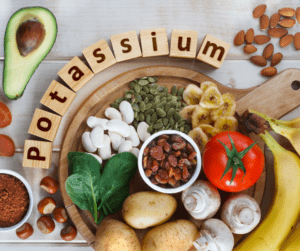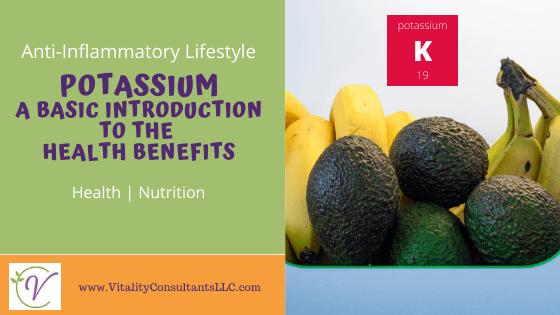What is potassium?
Potassium is an essential mineral that’s needed by our bodies to function normally. Potassium is used in the cells to help with nerve conduction, muscle contraction and blood pressure regulation. Where does potassium come from? How much do we need? These are important questions. As you read on, you’ll understand everything you need to know.
What is the role of potassium in the body?
Potassium is the master mineral that helps regulate fluid balance in the body. It helps maintain muscle contraction, normal nerve function, normal heart rhythm and blood pressure. Potassium is also important for bone strength and healthy skin. When potassium is low in the body, there is an increased risk for fatigue, muscle cramps, abnormal heart rhythms and even sudden death.
Potassium is also essential for proper cardiovascular function. It helps keep your heartbeat steady and normal and promotes healthy blood pressure levels. That’s why potassium-rich foods are an important part of any weight loss plan.
Potassium is a mineral that’s essential for maintaining healthy blood pressure and providing energy for the body’s cells. In fact, nearly all cell membranes in the body are made up of potassium. Potassium is one of the few minerals that can be used by the body regardless of other dietary needs.
How much potassium do we need in our diets?
Did you know that the typical American diet is low in potassium? Potassium is an essential mineral that is needed by the body for many important functions. It helps maintain healthy muscle contractions, nerve impulses, blood pressure and fluid balance. It also acts as an antioxidant and helps prevent cell damage caused by free radicals.
Potassium is an important mineral that helps maintain healthy blood pressure, nerve and muscle function, and the normal functioning of the heart. It also plays a key role in regulating water and electrolyte levels in the body. The Recommended Daily Allowance (RDA) for potassium is 4,700 mg per day for adults 19 years old and older. However, most Americans get only 30% to 50% of the RDA.
 So, where does potassium come from?
So, where does potassium come from?
Potassium is abundant in many whole foods, especially fruits, vegetables and fish. Foods that are rich in potassium include bananas, apricots, avocados, kale, spinach, tomatoes, pumpkin, peas, beet greens and sweet potatoes. Dark green, leafy vegetables are also good sources of potassium. Other foods that contain small amounts of potassium include coffee, eggs, milk, cheese, salmon, meat and poultry.
Can I be getting too much potassium?
Potassium is an important nutrient that helps keep your heart healthy. But did you know that too much potassium can be dangerous, especially if you have kidney disease? It can cause a condition called “hyperkalemia.” The good news? There are ways you can help keep your potassium levels within normal range. If you think you are at risk for hyperkalemia, speak with your doctor on ways to lower your potassium levels. Additionally, below are some things you need to know.
You may be at risk for hyperkalemia if you:
- Have kidney disease. It is the job of your kidneys to keep the right amount of potassium in your body. If there is too much, healthy kidneys will filter out the extra potassium, and remove it from your body through urine. However, when kidneys do not work well, they may not be able to remove enough potassium.
- Eat a diet high in potassium. Potassium is a mineral that helps keep the amount of sodium in your body balanced, especially for those who have problems with their kidneys. Some foods are high in potassium, such as orange juice and bananas.
- Certain drugs can help keep your kidneys from losing enough potassium. Taking these drugs can sometimes cause your potassium levels to rise. You should talk with your doctor before stopping a medication or changing your diet.
- Take potassium supplements, including a salt substitute, or eat bananas and dried apricots.
- If you have Addison’s disease, your body may not make enough of certain hormones, causing a condition called “hypopituitarism.” Hypopituitarism can occur if your body does not produce the right amount of a hormone called adrenocorticotropic hormone (ACTH). Hormones are chemicals that cause a specific response in your body.
- Have poorly controlled diabetes.
- Experience a serious injury or severe burn.
How do I know if I have high potassium?
A simple blood test can check your blood potassium level. People who are at risk of developing high potassium levels may want to ask their healthcare providers about getting a blood test for potassium. If symptoms of high potassium do develop, they are usually mild and non-specific. However, if you have a heart attack or other type of emergency, you should go to the nearest emergency room. High potassium levels can cause life-threatening conditions, so it’s important to get medical treatment right away. If you eat foods that are high in potassium such as bananas, legumes, avocados, nuts, and tomatoes, you may have a normal level of potassium in your blood, but if the potassium levels are too low for too long a time, you may experience one or more of the following: heart palpitations, shortness of breath, chest pain, nausea, or vomiting. This is a life-threatening condition that requires immediate medical care. If you have any of these symptoms, call 911 or go to the emergency room.
The good news is that there are options! If you have high potassium – or are at risk for getting it – ask your doctor about the various options you have to manage your potassium levels. It’s important you tell your doctor about all the medicines you are taking including over-the-counter drugs, herbs and supplements.
Want free anti-inflammatory recipes, downloadable resources and efficiency tips and tricks from a professional chef? Of course, you do! Click here for the secret sauce!







